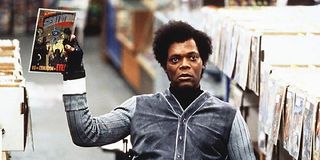Where M. Night Shyamalan Went Wrong: Unbreakable

After Earth, the new movie from director M. Night Shyamalan arrives in theaters this weekend…but you wouldn’t know it’s one of his films by watching the trailer. The filmmaker’s name is almost completely absent from the trailers and advertisements, and all this week we here at Cinema Blend are trying to figure out where it all went wrong. First up we have Eric, who explains how 2000’s Unbreakable was the movie that set Shyamalan on the wrong path.
M. Night Shyamalan’s Unbreakable is a very good movie. The story is subtle and the script has a great pace and structure. The performances, particularly those by stars Bruce Willis and Samuel L. Jackson, are engaging and thought-provoking. The direction is stylish and full of daring and attention-grabbing camerawork that adds to every scene. It’s an even more interesting to look back on now, as it was released in the earliest years of the 21st century superhero boom. It showed great promise from a filmmaker that knocked everybody’s socks off with his first feature…that is, until the final few minutes.
While it was the killer twist at the end of The Sixth Sense that first made both critics and audiences fall in love with Shyamalan, it was the cheap knock-off twist at the end of Unbreakable that was the definitive warning shot that should have told audiences to be wary of overpraising the newcomer writer/director.
A truly great final twist has a phantom effect on an entire movie, and completely changes the way you perceive the story. Rewatching Bryan Singer’s Usual Suspects you can track the thought process of the brilliant Kaiser Soze. Hell, in Shyamalan’s Sixth Sense knowing that Dr. Malcolm Crowe was dead the whole time makes you watch the film in a whole new light, as you put a greater emphasis on just how many people talk to the lead character. Unbreakable’s greatest sin is that the reveal of Mr. Glass’ villainy has precisely zero impact on the story that unfolded in front of it.
Ignoring the pointless, tacked-on ending, the movie is really the superhero origin story of David Dunn, a man unaware of his true identity and ability who is put on a path of self-discovery. The film is unlike any other in the genre in that for 99% of the film there is no central supervillain antagonist, just David’s inner struggle with belief in mythology and the boundaries of reality. His debate against himself is what makes the film unique and fascinating – and that originality is hurt with the stereotypical twist.
It’s somewhat ironic that Samuel L. Jackson would go on to play Nick Fury in the Marvel Studios films, as that’s exactly the role that Elijah Price should have been. Without the twist, Price is a complex, Professor Xavier-type character who looks at the existence of his condition and finds something magical and amazing in David – a person who exists on the opposite side of the spectrum. But with the last few minutes of the movie Shyamalan reduces him to being a weak trope – the yang to the hero’s ying. What’s more, his villainous plot doesn’t really make a great deal of sense: if he’s looking for the one person in seven billion who has the strength that contrasts his weakness, he’s keeping his sample size rather low by setting local fires and sabotaging modes of transportation. But I suppose, to his credit, the idea actually worked.
As solid a film as Unbreakable is, it also wound up poisoning Shyamalan’s career. Ending both of his first two directorial efforts with a big reveal resulted in audiences seeing him as “that guy who finishes his movies with a twist” – a nickname that would grow more and more sour with titles like Signs, The Village, and The Happening. Why didn’t Shyamalan just end the film with David revealing his real identity to his son? What would have happened to Shyamalan’s career if he had? Everything could have been different.
CINEMABLEND NEWSLETTER
Your Daily Blend of Entertainment News

Eric Eisenberg is the Assistant Managing Editor at CinemaBlend. After graduating Boston University and earning a bachelor’s degree in journalism, he took a part-time job as a staff writer for CinemaBlend, and after six months was offered the opportunity to move to Los Angeles and take on a newly created West Coast Editor position. Over a decade later, he's continuing to advance his interests and expertise. In addition to conducting filmmaker interviews and contributing to the news and feature content of the site, Eric also oversees the Movie Reviews section, writes the the weekend box office report (published Sundays), and is the site's resident Stephen King expert. He has two King-related columns.
Most Popular






